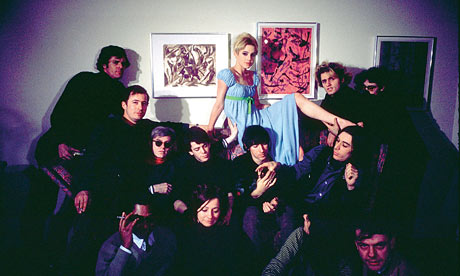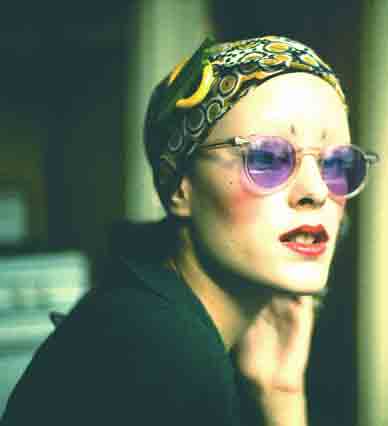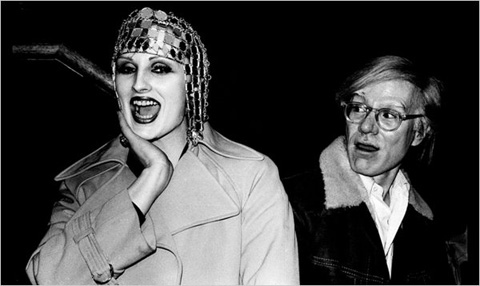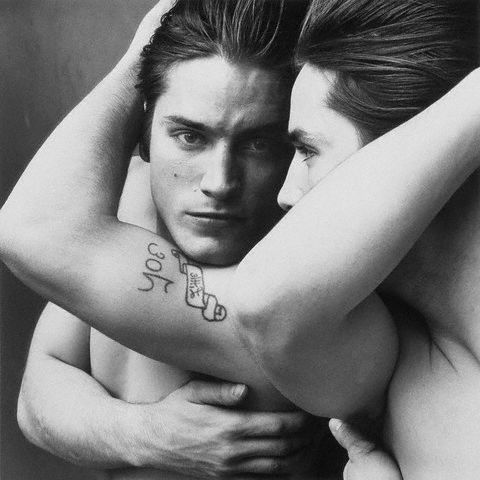 Andrea Feldman
Andrea Feldman Candy Darling
Candy Darling The Velvet Underground with Edie Sedgwick
The Velvet Underground with Edie Sedgwick Jane Forth
Jane Forth Viva
Viva Candy and Andy
Candy and Andy International Velvet (Susan Bottomly)
International Velvet (Susan Bottomly) Patti Smith and Jackie Curtis
Patti Smith and Jackie Curtis Holly Woodlawn
Holly Woodlawn Little Joe Dalleasandro
Little Joe Dalleasandro Edie Sedgwick
Edie Sedgwick

One of the most interesting visual artist of the Beat era, Wallace Berman (1926-1976) remains, for me, one of the best kept secrets of the late twentieth century. A crucial figure in California's postwar underground, Berman was a catalyst who traveled through many different worlds, transferring ideas and dreams from one circle to the next. His publication called Semina, a loose-leaf art and poetry journal that Berman published and personally distributed in nine issues occupies a legendary place within the California art world as the club for those in the know. An experiment in private, improvised art distributed among friends, Semina can be compared to the fascicles and letters of Emily Dickinson a century earlier; both Dickinson and Berman sought through their hand-made, private creations—often sent out as “mail art”—to coalesce a community that was at odds with the official world. Within the charmed circle of the Semina coterie, distinctions between literature and art collapsed: poets drew and made collages; artists and filmmakers wrote poems. Speaking for Berman, his wife Shirley asserts that he published Semina “because he loved poetry so much”. “We spent a lot of time reading poetry,” she recalls, insisting that poetry was a more fecund source of inspiration for Berman than two other art forms he adored, music and film: “His working process was to read poetry, all the new young poets”
Semina was an unbound journal printed on a hand press in editions of a few hundred and mailed to friends ‘like a surprise communication from an erratic correspondent’. Each installment of Semina consisted of loose-leaf pages of different sizes and shapes and featured works by dozens of the artists and poets who passed through Berman’s bungalow on Crater Lane, a loosely defined scene that included Bruce Conner, Jay DeFeo, Jack Hirschman, Joan Brown, Jess, Allen Ginsberg, Diane di Prima, Dean Stockwell, Dennis Hopper, Taylor Mead, Jack Smith, Walter Hopps, William Burroughs and many more.
I have included photos to get a feel of what an interesting and wonderful thing Semina culture truly was and it takes me back in time to a place where artist truly made art for arts sake as opposed to the drive for money and fame. Every photo and piece of poetry and art work inspires so much in me, mainly a sense of the magic in ordinary life and the simple style of working with what you have as we are all so full of our own magic as are the things around us.




















 A poem by Jack Hirschman
A poem by Jack HirschmanAfter his shouts, the strops, her screams, the thrown things,
the doorslam, the bitter weeping,
out of the thin box, as the delicate paper was parted,
she'd lift the sheer mojud stockings
and run her fingertips along them,
slowly smiling girlishly again.
She'd begin singing a Perry Como song,
she loved Perry Como and would sing
the same song he sang, all day long,
on the Make-Believe Ballroom Time.
Then, in a black brassiere strapped to her freckled shoulders,
she'd sit on the bed, fit the stockings,
stand up and notch them to the garters
that hung down from her black girdle,
A ripple of fat ran round her waist, squeezed out
by the girdle, different from
the plumps that swelled out from her brassiere.
And I saw a blue bruise, the shadow
of a belt-buckle on her thigh.
But she was singing again, and over the girdle
she'd put on a pair of pink bloomers,
and over everything, then,a brown-and-white flower-print
summer-golden dress.
Her white heels had holes in the toes where her nail-polish
showed through. The bottle of polish, tweezers, lipstick,
rouge, brush and emeryboard were on the vanity table
over there looking in the mirror.
Her lips swam in the Como song with rose-red strokes,
reaching the end with a shiny glow,
like the waxy cameo of her mother
on the brooch in the drawer.
She'd hold out her hand and say, "Come, darling?"
We'd walk hand in hand up and down our street
in the twilight,
and the neighbors would cry out: "Hi, Nellie!" or "Hello,
Mrs. Hirschman," and "Hi, Jackie. My, how you've grown!"
From Endless Threshold (Willimantic, CT: Curbstone Press, 1992)
 You're A Big Girl Now 1970s Plaid Cotton Shirt~
You're A Big Girl Now 1970s Plaid Cotton Shirt~ ******
****** A Simple Twist of Fate 1960s Edwardian Maxi Skirt~
A Simple Twist of Fate 1960s Edwardian Maxi Skirt~ ******
****** Tangled Up In Blue 1970s Levi's Plaid Western Shirt~
Tangled Up In Blue 1970s Levi's Plaid Western Shirt~ You're Gonna Make Me Lonesome When You Go 1980s Brown Hobo Jumper~
You're Gonna Make Me Lonesome When You Go 1980s Brown Hobo Jumper~ *******
*******
You're A Big Girl Now
Our conversation was short and sweet
It nearly swept me off-a my feet
And I’m back in the rain, oh, oh
And you are on dry land
You made it there somehow
You’re a big girl now
Bird on the horizon, sittin’ on a fence
He’s singin’ his song for me at his own expense
And I’m just like that bird, oh, oh
Singin’ just for you
I hope that you can hear
Hear me singin’ through these tears
Time is a jet plane, it moves too fast
Oh, but what a shame if all we’ve shared can’t last
I can change, I swear, oh, oh
See what you can do
I can make it through
You can make it too
Love is so simple, to quote a phrase
You’ve known it all the time, I’m learnin’ it these days
Oh, I know where I can find you, oh, oh
In somebody’s room
It’s a price I have to pay
You’re a big girl all the way
A change in the weather is known to be extreme
But what’s the sense of changing horses in midstream?
I’m going out of my mind, oh, oh
With a pain that stops and starts
Like a corkscrew to my heart
Ever since we’ve been apart
A Certain Lady
Oh, I can smile for you, and tilt my head,
And drink your rushing words with eager lips,
And paint my mouth for you a fragrant red,
And trace your brows with tutored finger-tips.
When you rehearse your list of loves to me,
Oh, I can laugh and marvel, rapturous-eyed.
And you laugh back, nor can you ever see
The thousand little deaths my heart has died.
And you believe, so well I know my part,
That I am gay as morning, light as snow,
And all the straining things within my heart
You'll never know.
Oh, I can laugh and listen, when we meet,
And you bring tales of fresh adventurings, --
Of ladies delicately indiscreet,
Of lingering hands, and gently whispered things.
And you are pleased with me, and strive anew
To sing me sagas of your late delights.
Thus do you want me -- marveling, gay, and true,
Nor do you see my staring eyes of nights.
And when, in search of novelty, you stray,
Oh, I can kiss you blithely as you go ....
And what goes on, my love, while you're away,
You'll never know.
~Dorothy Parker In the Mood for Love 1940s Asian Wiggle Dress~
In the Mood for Love 1940s Asian Wiggle Dress~ The Audrey Hepburn Ballet Dress~
The Audrey Hepburn Ballet Dress~ Murder on the Orient Express Two Piece~
Murder on the Orient Express Two Piece~ Lady Marmalade 1960s Mod Summer Dress~
Lady Marmalade 1960s Mod Summer Dress~ The Dark Love Flamenco Dress
The Dark Love Flamenco Dress Ballad of Dorothy Parker Dress
Ballad of Dorothy Parker Dress Spill the Wine Evening Dress
Spill the Wine Evening Dress









